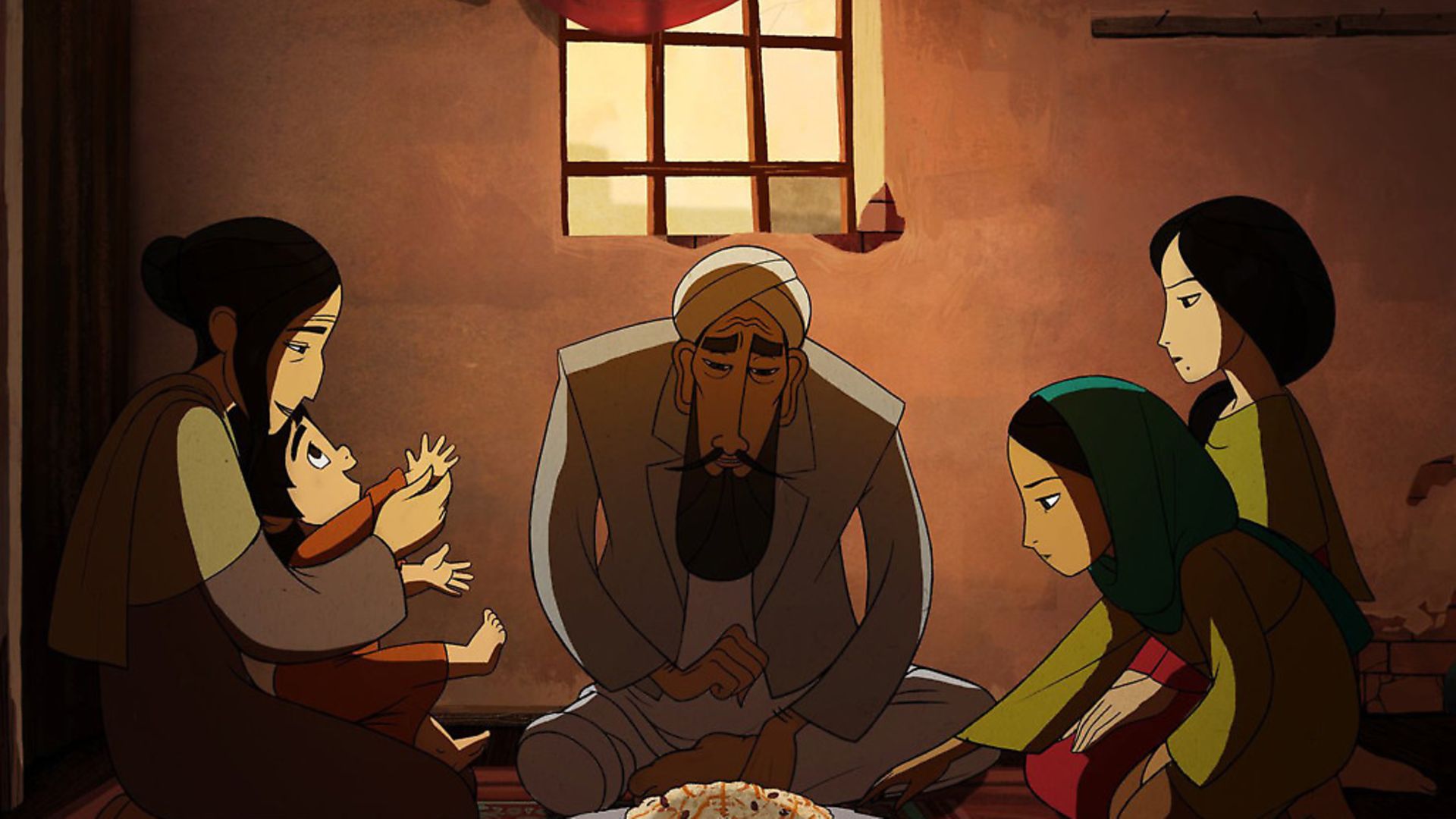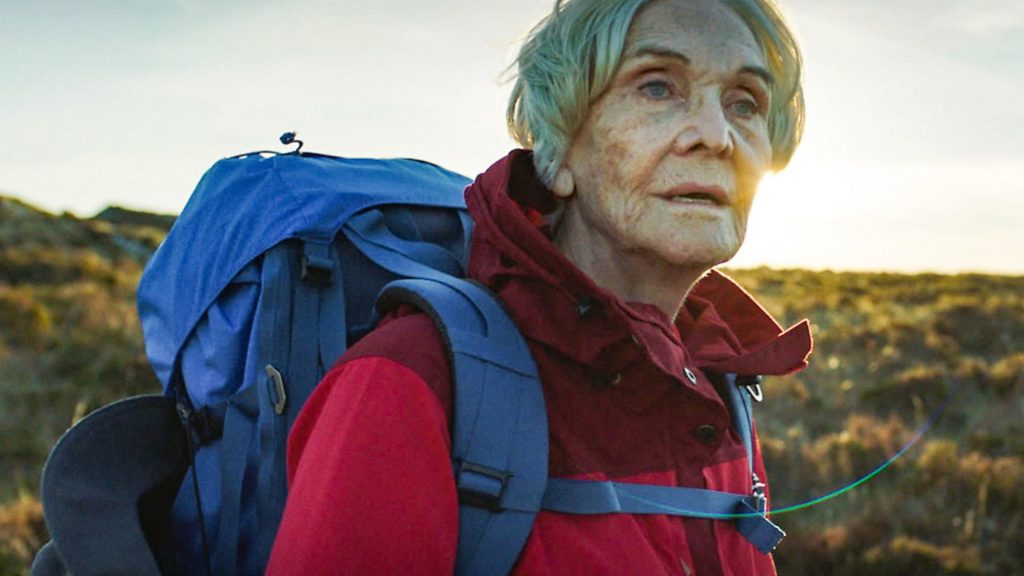
Caroline Crampton on two new films in which their very different lead characters strive for a slice of liberty.

The opening 30 seconds of Edie, a new film about an elderly woman at the limits of her endurance, are enough to melt your heart. Edith (Sheila Hancock) stares desperately out at the camera as her husband George slowly descends into the shot on a stairlift behind her. She supports him into a wheelchair, and then places him by the fire and starts to feed him. ‘Now swallow,’ she says after every mouthful, checking carefully to see that he has done so. It’s a scene of ordinary, everyday devotion – of a relationship much altered by circumstance and time but still going strong. It isn’t until later, when George has passed away and their daughter Nancy is helping her mother pack up the house prior to a move into a retirement home, that we learn that everything isn’t quite what it seems.
Nancy finds her mother’s diary from decades before in an old suitcase and reads it. On the page, Edie has poured out her unspoken frustrations at the limitations of her life. ‘Cleaning and caring, cleaning and caring, that’s all I seem to do,’ she writes. ‘Money is tight so can only afford the nurse once a week… Yesterday was my sixth day off in the past four years… The house is a prison… I thought having her would bring us closer together, in fact it did the opposite… Sometimes I want to get up and leave them behind.’
This isn’t the kind of sentiment we often get to hear from women on screen, let alone from a character played by an actor now well into her eighties. If it is dealt with at all, caring is portrayed as a joyful duty – done out of love and willing personal sacrifice, not unwaged labour that takes its toll on those who do it. In real life, of course, it’s a lot more complicated.
Edie, an independent film directed by Simon Hunter and written by Elizabeth O’Halloran, puts this invisible struggle on screen. Edie has been a carer for 30 years, suffering in silence, her diary her only outlet for her dashed hopes and ambitions.
Her husband was angry and controlling long before he became unwell, we learn – forcing her to cut off ties with her family and give up her beloved hobby of hiking.
When he was incapacitated by a stroke in middle age she felt that she had no option but to become his full-time carer. ‘He hid it when you were around, his rage,’ she tells her daughter as she storms from the house. Edie’s anger is palpable, there in every snap of Hancock’s head or regrettably spiky word she utters. Nobody cares about how her life has turned out.
After this arresting opening, the rest of the film follows a more predictable pattern. In a manner made familiar to us by other productions aimed at older, ‘grey pound’ audiences like The Best Exotic Marigold Hotel and Calendar Girls, Edie decides that it is not too late to pursue her dreams.
She hauls her musty camping equipment down from the attic and takes a sleeper train to the Scottish Highlands, determined finally to climb Mount Suilven just as she had always dreamed.
She finds an unlikely sparring partner in Jonny, a young man who works in a local camping shop, and embarks on a slightly slapstick training regime that involves a lot of falling in bogs.
Despite the story’s descent into sentimental predictability in the latter stages, the cinematography saves this film. Endless sweeping shots of stunning Highland scenery, imaginatively filmed and soundtracked by composer Debbie Wiseman’s excellent score, mean that it is still a pleasure to watch, even if most of the narrative tension has leaked away.
Perhaps best of all, though, is the fact that Hancock (now aged 85) did actually climb the mountain in order to make this film. I might have ceased to be very interested in Edie as a character by the time she reached the top, but I still came away impressed by the resilience and persistence of an older woman in the face of adversity.
At the opposite end of life is Parvana, a young Afghan girl and the protagonist of the Oscar-nominated film The Breadwinner. She is growing up in Kabul after the Soviet war, with the Taliban roving the streets and beating women who venture out without a male guardian. Like Edie, she visibly chafes at the restrictions laid upon her by a patriarchal system, in which she is supposed to remain unseen and unheard.
This film, which was executive produced by Angelina Jolie and directed by the Irish filmmaker Nora Twomey, has a charming animation style which effortlessly combines the grimness of post-war Kabul with the fantasy landscape of Parvana’s imagination. The mountainous vistas over the city are stunning, and easily slide into the legendary tales of jaguars and elephants that she tells her little brother to keep him amused.
The Breadwinner has a lot in common with Persepolis, the 2007 animated film based on Marjane Satrapi’s graphic novel memoir of the same name. Persepolis covers Satrapi’s coming of age during the Iranian Revolution and her struggles with the restrictions the new fundamentalist regime imposes on her life, from modest dress to the lack of available pop music. Both films place their young female protagonists at the centre of the action, in direct contrast to the oppressive societies they portray.
Education is the only escape for these girls – the only way in which they can express themselves and attain some degree of control over their lives, however small that may be.
In a move reminiscent of the real-life story of the Pakistani campaigner Malala Yousafzai, Parvana’s schoolteacher father encourages her to continue reading and writing stories even though girls’ education is prohibited.
He pays the price for it – one night, he is hauled from his bed and dragged off to prison after word of his secret teaching gets out.
Parvana, her mother Fattema, her older sister and baby brother are left without a working-age man to act for them. The Taliban dictates that as women they may not even buy food for themselves in the market, and an attempt to go to the prison to plead for their father’s release results in Parvana’s mother being badly beaten.
This scene is particularly arresting. Swathed in her blue burka, her face and the shape of her body completely obscured by the fabric, Fattema pleads with her accuser and tries to explain that she is just trying to secure her husband’s release so that they can return to a properly ordered, male-dominated life.
The Taliban partisan is having none of it – he grabs the walking stick that she has brought for her disabled husband and beats her to the ground, still wrapped in the burka.
The film is based on a young adult novel, and clearly has a younger audience in mind, so the true extent of the violence isn’t shown. The effect is more powerful for it: when she finally does reach home, Parvana’s mother crawls into bed without taking off her burka, determined to shield her children from the sight of her injuries. One bruised foot is all we see.
After this, Parvana takes matters into her own hands. In a moment reminiscent of Disney’s 1998 animated film Mulan, she cuts off her hair and dons her dead elder brother’s clothing. Disguised as a boy called Aatish, she is able to move about the city freely, buying food for the family and even earning money by reading letters for illiterate neighbours and teaching others how to read and write.
She meets a friend, Shauzia, from when girls were still allowed to go to school, who has also disguised herself as a boy. For a brief moment, the pair revel in the freedom that their new identities give them.
As boys, they can run through the streets, break into old buildings to play and steal food and, as long as they are not recognised, have jobs.
Even as the film goes on to deal with the wider issues of the Taliban’s oppressive rule and Parvana’s family tragedies, these brief moments where the two girls laughed and played together stayed with me.
It was only by no longer being a girl that Parvana could smile, have fun with her friend, and make her own way in the world. Even in the bleakest of times, with little hope that her situation will ever improve while her gender continues to be considered a crime by those in power, there is a little light to be found amid the darkness.
Of course, catastrophe soon follows this moment of levity. This film has a tightly plotted narrative arc, with the denouement partly told through the mythical fantasies that Parvana has been creating in her head all along, but this moment of snatched liberty lingers. Like Edie on the mountain, Parvana tastes what her life could have been like if everything had turned out differently. In these films, the invisible women are, for a moment, in the spotlight.
Edie and The Breadwinner were both released in UK cinemas on May 25







